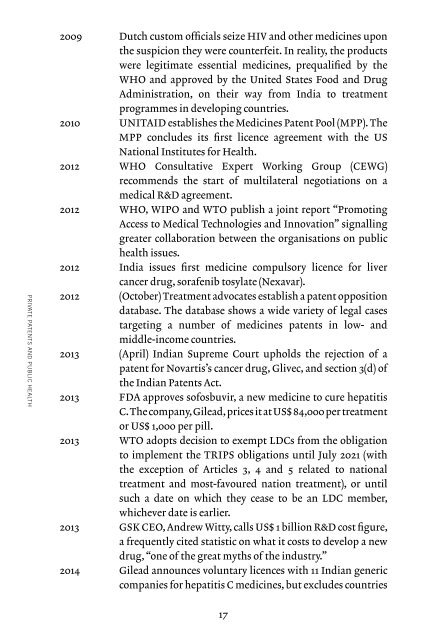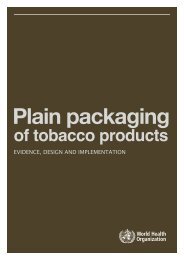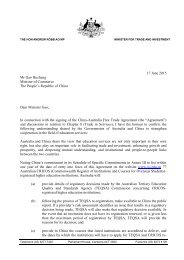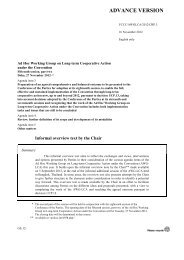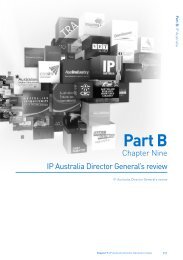PRIVATE PATENTS AND PUBLIC HEALTH
private-patents-and-public-health
private-patents-and-public-health
Create successful ePaper yourself
Turn your PDF publications into a flip-book with our unique Google optimized e-Paper software.
<strong>PRIVATE</strong> <strong>PATENTS</strong> <strong>AND</strong> <strong>PUBLIC</strong> <strong>HEALTH</strong><br />
2009 Dutch custom officials seize HIV and other medicines upon<br />
the suspicion they were counterfeit. In reality, the products<br />
were legitimate essential medicines, prequalified by the<br />
WHO and approved by the United States Food and Drug<br />
Administration, on their way from India to treatment<br />
programmes in developing countries.<br />
2010 UNITAID establishes the Medicines Patent Pool (MPP). The<br />
MPP concludes its first licence agreement with the US<br />
National Institutes for Health.<br />
2012 WHO Consultative Expert Working Group (CEWG)<br />
recommends the start of multilateral negotiations on a<br />
medical R&D agreement.<br />
2012 WHO, WIPO and WTO publish a joint report “Promoting<br />
Access to Medical Technologies and Innovation” signalling<br />
greater collaboration between the organisations on public<br />
health issues.<br />
2012 India issues first medicine compulsory licence for liver<br />
cancer drug, sorafenib tosylate (Nexavar).<br />
2012 (October) Treatment advocates establish a patent opposition<br />
database. The database shows a wide variety of legal cases<br />
targeting a number of medicines patents in low- and<br />
middle-income countries.<br />
2013 (April) Indian Supreme Court upholds the rejection of a<br />
patent for Novartis’s cancer drug, Glivec, and section 3(d) of<br />
the Indian Patents Act.<br />
2013 FDA approves sofosbuvir, a new medicine to cure hepatitis<br />
C. The company, Gilead, prices it at US$ 84,000 per treatment<br />
or US$ 1,000 per pill.<br />
2013 WTO adopts decision to exempt LDCs from the obligation<br />
to implement the TRIPS obligations until July 2021 (with<br />
the exception of Articles 3, 4 and 5 related to national<br />
treatment and most-favoured nation treatment), or until<br />
such a date on which they cease to be an LDC member,<br />
whichever date is earlier.<br />
2013 GSK CEO, Andrew Witty, calls US$ 1 billion R&D cost figure,<br />
a frequently cited statistic on what it costs to develop a new<br />
drug, “one of the great myths of the industry.”<br />
2014 Gilead announces voluntary licences with 11 Indian generic<br />
companies for hepatitis C medicines, but excludes countries<br />
17


